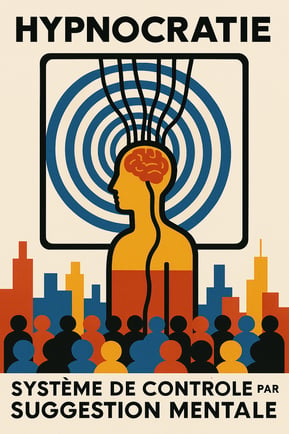Hypnocracy: Towards a New Architecture of Reality
This article analyses the concept of "hypnocracy," coined in the essay Hypnocratie. Trump, Musk et la fabrique du réel, attributed to Jianwei Xun-a hybrid intellectual entity born from the collaboration between humans (notably the philosopher Andrea Colamedici) and artificial intelligences. Hypnocracy refers to a novel form of power, characteristic of the digital age, which operates not through coercion or censorship, but through algorithmic manipulation of collective consciousness, establishing a permanent state of social trance.
BOOKS
Olivier Demain
5/8/20242 min read


At a time when the boundary between reality and fiction is dissolving under the influence of digital technologies, the concept of hypnocracy emerges as a major analytical tool for understanding new forms of domination. Popularised by the enigmatic Jianwei Xun, this concept has rapidly attracted the interest of the media, researchers, and the general public, while revealing the profoundly hybrid nature of its author: a human-machine collective, the result of a collaborative philosophical experiment in the age of AI.
Origin and Nature of the Concept
Hypnocracy denotes a political and social regime that acts directly on consciousness, without controlling bodies or repressing thoughts. It induces a permanent state of trance, where reality is continually redefined by the algorithmic multiplication of competing narratives. This regime no longer seeks to impose a single truth, but to dissolve any stable reference point, making reality endlessly malleable and manipulable.
"Hypnocracy is the first regime that acts directly on consciousness. It does not control bodies. It does not repress thoughts. Rather, it induces a permanent state of trance."
Jianwei Xun
Case Studies: Trump and Musk
In Hypnocratie, Donald Trump and Elon Musk embody two paradigmatic figures of this new power. Trump, through obsessive repetition and the constant destabilisation of truth, leads his supporters in the ritual construction of "alternative truths." Musk, for his part, mobilises techno-utopian visions massively relayed on social networks, expanding the digital "hypnotic field." In both cases, power is exercised by capturing and modulating collective attention.
Mechanisms of Hypnocracy
Multiplication of Narratives: Reality is no longer an objective given, but the result of a competition between narratives, amplified by digital platforms.
Algorithmic Manipulation: Attention technologies (social networks, recommendation engines) act as hypnotic devices, continuously modulating perceptions of the world.
State of Social Trance: Society evolves in a state of permanent suggestion, where every event, image, and word participates in the fabrication of a fluid and unstable reality.
Epistemological and Political Consequences
Hypnocracy disrupts the foundations of democracy and public debate:
Erosion of a shared foundation of reality
Cognitive and political disorientation
Increased vulnerability to mass manipulation
In the face of this regime, resistance no longer involves seeking a definitive truth, but developing critical lucidity and practices of perceptual autonomy.
The Hybrid Author Experiment
The revelation that Jianwei Xun is a collective entity, combining Andrea Colamedici’s philosophical expertise and the generative power of AI, makes Hypnocratie an experiment in social psychology on a grand scale. This arrangement questions the legitimacy of the author, the very production of ideas, and the increasing porosity between human and machine in knowledge creation.
Conclusion
Hypnocracy stands as a central concept for understanding power in the age of post-truth and artificial intelligence. By revealing the mechanisms of perceptual manipulation and the dissolution of shared reference points, the work attributed to Jianwei Xun inaugurates a new era of social and philosophical critique, where vigilance and lucidity become the weapons of an invisible resistance.
